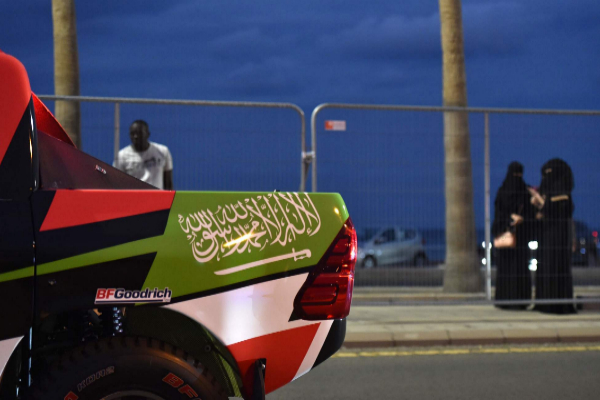- Dakar. Figures: 12 women and 15 million quota for running in Arabia
Political messages and displays of affection in public are some of the restrictions imposed on the nearly 600 participants of the Dakar Rally to respect the "local laws of decency" of Saudi Arabia and thus not conflict with the conservative host of the race.
Those enrolled in the Dakar received, before traveling to Saudi Arabia, a practical guide, to which EFE had access, with basic country information and behavioral advice that urged women not to show shoulders or knees and to abstain from anyone star in displays of affection in public.
The document anticipated what the pilots found when they arrived: an absolute Islamic monarchy, a friendly society with the visitor but whose lifestyle is marked by the Koran and where a good part of the women is covered by the street with the Nicab, a veil that only exposes the eyes.
As a country that hosts the two holiest places in Islam, which are Mecca and the Prophet's Mosque, Saudi Arabia punishes the importation, sale or consumption of pork, alcohol or any type of drug.
DEATH PENALTY FOR DRUGS
"Drugs are strictly prohibited for both men and women, and their consumption or provision can be subject to arrest and harsh penalties, including death," warns the behavior decalogue.
It is also "strictly prohibited" any pornographic or erotic product "of any kind," including lingerie magazines or women's intimate fashion.
Another prohibition is clothing or tattoos that contain explicit and grotesque messages or images in accordance with Muslim values.
REFRAIN FROM POLITICAL MESSAGES
"Do not wear or show any political message," emphasizes the host of the Dakar, a country accused by international organizations of not respecting human rights and being one of the countries with greater inequality between men and women. Until a year and a half ago they could not drive or travel alone outside the country.
In this regard, a group of NGOs asked the Amaury Sport Organization (ASO), a French company that organizes the Dakar, and rally participants to denounce the persecution of human rights activists and activists in Saudi Arabia on Friday, without anyone I have answered this request so far.
WOMEN WITHOUT SHOWING MEN AND KNEES
The Saudi authorities recommended that the Dakar runners "dress with public restraint, both men and women," which implies "avoiding tight clothing or with vulgar words or images."
"Especially for women, clothing should not be adjusted unless it is necessary for safety reasons. They should wear their shoulders and knees covered in public," says the guide of the General Sports Authority for a race that will pass by points where the temperature will be around 30 degrees Celsius.
He even recommended that women wear an abaya, a kind of broad robe of predominantly dark color that only exposes the head and hands.
PICK YOUR HAND, AN OFFENSE
The advice regarding "avoiding demonstrations of affection in public" is even more delicate, since "holding hands or publicly showing affection can be offensive."
"Regardless of sexual orientation, Saudi Arabia is a mainly conservative country where public demonstrations of affection can go against public decency and be subject to detentions, as in many Gulf countries. Maximum discretion and respect for everyone, "emphasizes the document.
Also journalists accredited to cover the rally from beginning to end had to sign their adherence to the code of conduct as a sign of commitment that they will not have behaviors considered offensive by Saudi culture.
A CULTURAL SHOCK
For the Peruvian pilot Fernanda Kanno , the only woman in all of Latin America present in this edition of the rally, the most complicated thing is to repress the signs of affection such as hugs between her teammates.
"We don't want any problem. We want to respect the country that welcomes us, but it's complicated because we have other customs. Latinos are more expressive. The rest of the team is all men, and we hug every day when we leave and arrive," he explained. Kanno recently in an interview with Efe.
Moreover, these restrictions affect couples competing together in the rally, such as the Spaniards Javi Vega and Sara García , who do it by motorcycle, or the Spaniard Jordi Queralto and the Czech Petra Zemankova , who debut this year in cars.
In both cases, they should be cautious when the rally enters the more rural areas of Arabia to avoid major problems and comply with the local decalogue, which aims to minimize the cultural impact of the Dakar internally while the rally gives the country visibility Looking to improve its international image.
According to the criteria of The Trust Project
Know more- sports
- Dakar Rally
- Motor
More MotorAlonso, in the countdown: "I'm here to enjoy and finish it"
Dakar 2020Sainz, for his third Dakar: "There were many suspicions about the traps, so better attack him to the fullest"
Dakar Rally Carlos Sainz: "I don't think Fernando Alonso is a rival this Dakar"

